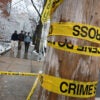In this second installment of our series highlighting the thoughts of conservative and libertarian leaders on the American Founding, we asked: Do you have a favorite story about America’s Founding? (This series will continue until July 4.)
Eric O’Keefe, Chairman of the Sam Adams Alliance: The Boston Tea Party happened during a time of very low taxes, and the tea in the harbor had the lowest price of any tea from Britain for years, because the British government sharply lowered the duties on the tea, while retaining a modest tax. The duty and the tax both went to the British government, but the patriots had drawn a line that did not define duties as taxes. So the British imposed that tax not to raise revenue, but to exercise their claimed authority to be able to impose whatever taxes they wanted. The Boston Tea Party was conducted entirely based on a principle; taxes were low, not high. But the patriots viewed their local control of government and taxes as an essential anchor for their liberty, so they rebelled at a violation of a basic principle.
Gary Palmer, President of the Alabama Policy Institute: One of my favorite stories about America’s founding also involves my favorite Founding Father—George Washington. Perhaps Washington’s greatest test occurred in March, 1783 in response to the Newburgh Conspiracy. Joseph Ellis, in his biography entitled His Excellency George Washington, called this the “The Last Temptation of Washington.” During the War for Independence in 1780, the Continental Congress enacted a resolution to give veteran officers a pension of half pay for life. However, by the winter of 1782-83, it was evident that Congress did not have the revenues to fund their promise nor did they have any real prospects for raising the money. Congress then passed a resolution cutting the pension to full pay for five years which they could not pay either.
These actions resulted in a petition being circulated among Washington’s officers that included implied threats against Congress if the officers’ pensions were not assured. The threats ranged from a coup by members of Congress sympathetic to the plight of the officers and supported by a more moderate group of Washington’s officers to an outright army takeover of the government which had the support of more radical officers. The leaders of the two groups scheduled a meeting for March 11th, but Washington cancelled the meeting and scheduled another meeting for all officers on March 16th.
It was at this meeting, attended by about 500 officers, that Washington gave the greatest demonstration of his character. Unlike other military leaders who used their power and influence to make themselves dictators, Washington did not take advantage of the opportunity to overthrow Congress and take control of the government. As Ellis wrote, though sympathetic to the plight of his officers, Washington “established a link between his own honor and reputation and the abiding goals of the American Revolution.” Every man in the room understood that an assault on Congress would be an assault on Washington’s own honor and integrity. Washington’s speech declared his convictions that the entire war had been about a fundamental principle … that all legitimate governmental power was derived from the consent of the people. To overthrow the government of the people would be to destroy all that they had fought for.
As convincing as his speech was to be, Washington changed the disposition of every man present before he uttered one word of it. Just prior to reading his speech, Washington reached inside his waistcoat to pull out a pair of spectacles. As he looked out to his assembled officers, who had not seen him in need of them before, he said, “Gentlemen, you will permit me to put on my spectacles, for I have not only grown gray, but almost blind in the service of my country.” At that point several officers began to weep. The entire mood among the assembled men changed. Without uttering a word of his speech, the Newburgh Conspiracy was ended and the fledgling American Republic was saved.
Matthew Spalding, Director of the B. Kenneth Simon Center for American Studies at The Heritage Foundation: One of my favorite stories is from an interview I discovered in the course of writing my recent book [We Still Hold these Truths]. It is with Levi Preston of Danvers, Massachusetts. He was in his early twenties in the spring of 1775 when he fought at the Battle of Concord, at the opening of the American Revolution.
As is often the case with stories or quotes, the best are those that capture an idea.
Many years later, Captain Preston was asked why he went to fight that day. Was it the intolerable oppressions of British colonial policy, or the Stamp Act? “I never saw any stamps.” What about the tax on tea? “I never drank a drop of the stuff; the boys threw it all overboard.” It must have been all your reading of Harrington, Sidney, and Locke on the principles of liberty? “Never heard of ’em. We read only the Bible, the catechism, Watt’s Psalms and Hymns, and the Almanack.” Well, what was it? asked the interviewer. What made you take up arms against the British?
“Young man, what we meant in going for those redcoats was this: we always had governed ourselves, and we always meant to. They didn’t mean we should.”
Today when we think of self-government, we usually have in mind the various forms of political participation, like voting in elections or serving on a jury. These activities are a very important aspect of the concept. But in addition to these practices, the Founders meant the preconditions that were required for the success of that process and that fulfilled man’s higher purpose beyond the limited ends of government.
The Founders understood self-government in the twofold sense of political self-government, in which we govern ourselves as a political community, and of moral self-government, according to which each individual is responsible for governing himself. They believed that the success of the former required a flourishing of the latter. Individuals could not govern themselves as a body politic unless they were each first capable of governing themselves as individuals, families, and communities.
Moral self-government both precedes and completes political self-government, and thus political freedom. It is in this sense that the primary as well as the culminating first principle of American liberty is self-government—an idea wonderfully captured in this simple quotation from a man long forgotten but who understood it, who fought for it.
































4 Replies to “Favorite Stories about the Founding”